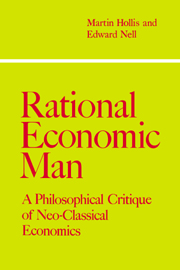Book contents
- Frontmatter
- Contents
- Preface
- Introduction
- 1 Relevance and falsification
- 2 Rational economic man
- 3 Theory and hypothesis
- 4 Facts and theories
- 5 Behaviour and prediction
- 6 A priori knowledge
- 7 Deductive explanation
- 8 The assumptions of neo-Classicism
- 9 Rationalist foundations for economic theory
- Bibliography
- Index
- Frontmatter
- Contents
- Preface
- Introduction
- 1 Relevance and falsification
- 2 Rational economic man
- 3 Theory and hypothesis
- 4 Facts and theories
- 5 Behaviour and prediction
- 6 A priori knowledge
- 7 Deductive explanation
- 8 The assumptions of neo-Classicism
- 9 Rationalist foundations for economic theory
- Bibliography
- Index
Summary
The Azande have a deep and systematic belief in witchcraft, oracles and magic. Witchcraft adds an uncertainty to life, which oracles dispel and magic controls. In practice, however, oracles are often inaccurate and magic often incompetent. So a decent scepticism about them might seem called for. But Zande beliefs are resilient. As Evans-Pritchard describes them in his Witchcraft, Oracles and Magic among the Azande:
Azande see as well as we that the failure of their oracle to prophesy truly calls for explanation, but so entangled are they in mystical notions that they must make use of them to account for the failure. The contradiction between experience and one mystical notion is explained by reference to other mystical notions.
Witchcraft, oracles and magic form an intellectually coherent system. Each explains and proves the others. Death is a proof of witchcraft. It is avenged by magic. The accuracy of the poison-oracle is determined by the king's oracle, which is above suspicion.
The parallel with Positive economics is too close for comfort. Failure of prediction is proof of interference. Interference is removed by ceteris paribus clauses and by adjusting observed variables to their true values. The scope of clauses and adjustments is determined by theory and theories are validated by checking their implications against facts. But the parallel stops, when we look for the king's oracle. A solution to the riddle of Induction would serve nicely but we have failed to find one. Without it, theories do not support hypotheses, hypotheses cannot be tested and tests show nothing. If it is a coherent world that we want, the Azande are better off than we.
- Type
- Chapter
- Information
- Rational Economic Man , pp. 95 - 113Publisher: Cambridge University PressPrint publication year: 1975



